You can’t go wrong with some sugary twee pop, but Australia’s Olivia’s World have a bitter edge to them. Led by Alice Rezende (vox and guitar), who initially created the alias for solo material, the band is rowdy and transcendental.
Their long-brewing debut album, GREEDY & GORGEOUS, sees Rezende reflecting on true and imaginary frustrations, modern life, desires, and longing. With help from her bandmates, Joe Saxby, Daan Steffans, and Jordan Rodger, the album is full of sweet, harmonious pop songs with cutting guitar riffs. Genre-wise, they sit comfortably in the carefree dolewave sound, next to Twerps, the Courtneys, and Tiger Trap, but if those groups had a hardcore edge. Still, Olivia’s World are doing their own thing—you don’t see many Aussies doing twee pop with teeth. Rezende knows that. Canberrans Steffans and Rodger, who are new additions to the band, happen to complement that unique element. As such, this reinvigorated iteration of Olivia’s World has provided the band’s fullest statement yet: Rezende both loudly and tenderly releasing her enduring ruminations upon the world.
GREEDY & GORGEOUS is set to arrive on March 14th with records through Little Lunch Records in Australia and cassettes from Lost Sound Tapes in North America and Canada. I spoke to Rezende about collating her songs into an album, writing music while working at an art gallery, and the band’s place in Australia’s music scenes.
I’ve sat with GREEDY & GORGEOUS for a while, but it’s great. What were the earliest songs to come out of it? I know it came together for a long time, over several years.
Alice Rezende: I was just writing some answers to different things. The oldest song is probably the opener “Porcupine Girl,” although… There’s just stuff that’s been brewing for a long time, like “Porcupine Girl,” “Chemlab,” and “Oskar.” “Oskar” is a song about a real person I was friends with in Vancouver. I wrote that song a long time ago, but I just never had the guts to release it. “Porcupine Girl” was a song I wrote in the heart of COVID and on a nylon string, I thought it was like a joke song, but Joe was in love with it. He was, like, “You’ve gotta release it.” I always thought it was really soppy and I didn’t want to release it. *laughs* Same with “Oskar.” My softer songs I really struggle with, because I always want to go harder with the sound. But I struggle, because I think my DNA is really twee and I end up going there. I just embrace it at the very last minute.
Then newer songs like “Sourgum” I wrote for the new rendition of the band specifically. We didn’t have a drummer in Canberra, so we played it for the first time with Daan, and it was amazing. It was so powerful. For the album, I wrote “Empresário,” like, a week before. Same with “Beauty bar,” I wrote that a couple weeks before. I was just kind of rushing, kind of like an incentive to write. I was just in a mad rush. I didn’t have songs, I kind of liked having that mixture, because there’s songs you’ve sat with for a long time and songs that are still fresh.
With all the songs coming from different places and times and having to put the record together, was it challenging to make it all fit?
AR: Well, yes and no. Thematically, there’s always dissonance in the songs that I write. With our second EP, TUFF 2B TENDER, it was a very big statement about what happens in my songwriting, which is “tough” and “tender.” I kind of understood that then. My newer vein I try to go sonically in is harder, because I love tougher bands. I really love that kind of thing happening even in Australia, like with It Thing, Kosmetika, and female-fronted bands. All these Melbourne bands where women are being really aggressive—I really love that—I don’t think I’m exactly that, but I love it.
Then I love older ‘90s bands who are super twee and have a really melodic sound. I was really into Liz Phair’s GIRLY-TAPES—the demos, specifically—when I was thinking about the softer sounds for the record. Sonically, it hits something so differently. Even Horsegirl, who’s a current band of three girls, their first record—not that I am them, but in a sort of parallel—was dense, chunky, and guitar-driven. Now they were produced by Cate Le Bon and were somewhere really minimal: I just like that. So I think when it comes to contrast, I’m okay. That’s what the record is and I like that.
For sure. I hear those tougher bits, especially in the middle section, like in “Empresário” and “Chemlab.” They have those bursts of energy. When you wrote these songs, you said you used to be an art gallery invigilator. I assume you brainstormed words in those spaces and they went into the record. I’m curious since it’s all in a creative space, but what was it like writing in that environment and translating the words into an album like this?
AR: Being an invigilator is tough… You’re such a mop, you’re such an art mop. I felt like an art mop. Now I’ve achieved some semblance of a professional goal and I’m still not happy. *laughs* But I think one of the… It was this very, very, very strong sensation of dissatisfaction being on the floor, like a strong feeling of dissatisfaction with my life. I was still studying and I felt looked down upon every single day *laughs* in my little shirt, tie, and scarf. We had to wear this ridiculous uniform… So, as an invigilator, you have to swap around the gallery. You go upstairs, you’re, like, “Look at this. Make sure this…” and then you kind of swap around all day long. We have this rotating shift, so they print this piece of paper every day. I used to write my lyrics on it. I still have it in my lyric book, cut up bits of my roster sheets. It’s really cute. But like, I used to write poems on it. Because you’re not allowed to have your phone at all.
In some galleries, where a lot of the invigilators are texting, I’m like, “Man, I would have been murdered. I would have been fired on the spot.” It was such an operation. You had to tell your bosses that you were going to the bathroom. You had to radio the entire channel with all the other invigilators: “Could I please go to the bathroom?” And then you had to say, “My section’s really quiet,” that’s why you’re going to the bathroom. You couldn’t say, “I need to shit. My section’s full of people.” I think that hardship creates really great art. It’s a huge proponent. Yeah, it was fun. But I don’t think that’s necessarily always the case. You can thrive and be gorgeous and greedy and still have it all. You know what I’m saying?
For sure. There’s also a new rendition of the band with Daan Steffans and Jordan Rodger. How has having them in the project changed the music, sound, or live experience?
AR: They’re incredibly gifted. Daan is not only musically gifted, but he’s also just got the gift of gab. He’s a really prolific social agitator and just makes shit happen in Canberra. When I first met him, that is why I wanted to be his friend. I just thought he was such a community builder, so young and so passionate about the music scene. Literally, he’s the heart and soul of Canberra. He’s got a pretty tough drum style. Canberra is very hardcore-oriented, I think, which is cool. It’s very dark and very cold, so everyone’s really angry. First, it was just the three of us and Daan was intrigued by some of the soft songs. I was like, “I don’t think he’s going to like our stuff.” But he was always like, “I love this song!” Even “Beauty bar,” which we rehearsed in his garage before going to the studio. It’s the sweetest GIRLY TAPES-inspired song and he was like, “This song is beautiful, I just love it.” I was like, “What’s wrong with this man?”
Jordan used to play in another band, but it was a two-piece and he was on drums. I was, like, “Wow, this is a really strange drummer.” He actually approached us saying how much he liked the music and I was like, “I think he wants to be a part of it.” But I wasn’t sure, so I invited him to play. He used to play in TV Colours. He’s just the best guitarist I’ve ever met and he’s a music teacher.
I don’t really write anyone’s parts, obviously. They just brought their own elements. Jordan’s guitar completely enriched the sound of Olivia’s World. We’re such a different band live now, thanks to Jordan and Daan. Daan is an outgoing drummer, so he’s kind of finished up because we’re now in Sydney but he also has a lot of projects. We have a new drummer here in Sydney, Dirk Jonker, who plays for Bloods. He’s got a really powerful style as well. I think Joe and I mostly write the skeletons of the songs. In a way, there’s a thread of sameness and commonality still existing, but the new contributors changed the sound so much. I think this record is a product of the four of us for sure.
Am I right in saying Olivia’s World started as a solo project?
AR: Yeah, so the band I used to be in before… broke up because I was in a romantic relationship with them. And so when that finished, the band also finished. Then I had all these songs and I continued writing. Joe was helping with putting my demos out and mixing them lightly. I just pushed Joe into playing bass for me. But yeah, it did start as sort of me just writing.
So, the new album is like a culmination of everything beforehand, like a fully realized statement up to this point?
AR: Well, yeah, I’ve been a musician for so long and I’ve never released a full-length, which is really embarrassing. So I was, like, “If I don’t do that and I die, what will be of my life?” I was like, “I’m ready.” It’s a pretty short one and I concede, it’s very short, but I think now I know how much better it can be to release an EP. This might sound strange, but I don’t think people care about singles anymore. I certainly don’t. I like to see a band’s sort of thicker… You want to see more of their vision, which I think is always nice.
With GREEDY & GORGEOUS, you’ve made this album, partly to have an album written, but is there also something you wanted to say with it? Maybe with the thematic concepts—is it all drawn from personal experience or are there some fictional elements?
AR: I think there’s definitely fantasy elements at all times. My writing is a bit psychedelic. I like to write in sort of imagery—there are imprints of real life that stay with me kind of as a visual. I think I start there if that makes sense, and you always either beautify or distort. Like “Empresário” is definitely not a real person. It was me pretending that I had a really bossy and crazy aloof manager. The theme is about being molded after someone’s idea of you.
At the time, at work, I was working in a really big gallery. There were all these terms being thrown around, like “in the round” and “in the real.” When you see a sculpture “in the round,” it means you see it 360 and I’d never heard that before. I thought that was so weird. My boss used to say, “You have to see it in the round” and sometimes she’d also say, “It’s so much better in the real.” They’re these really precious terminologies. I was thinking of this idea of us—you, the artist’s sculpture—and it’s a bit of a play, but a snobby sort of joke on that.
On the thematics, it’s nice to have a slice into or an angle on something. Like I don’t think necessarily it’s all about self-image, or if it is about self-image at all. I think it’s a pretty unique experience of my modern life, like ROCKO’S MODERN LIFE if I was Rocko. *laughs* Like we’re in this hyperdome of consumerism and this tunnel vision of influencing and you know, I think they’re really interesting things to think about and they’re funny. *laughs* I love when people play with these modern ideas and challenge them, but not completely reject them. I think we’re all seduced by modern life, but at the same time, I think there’s this misplaced desire which a lot of people have. We’re looking for all these things to fill our lives with, but I think we’ve got these deep, deep, deep… I think our subconscious mind has much more deep desires we don’t even understand. I guess I’m just trying to let them out, and not trying to interpret them even though… they’re pretty obvious.
No, I get what you mean! It’s like playfully exploring all those things that most people don’t want to look into…
AR: And deal with it?
Yeah, exactly. It’s like accepting it for the most part, but they are there, some people don’t wanna deal with the baggage. It’s a fun way of exploring them, especially through this medium.
AR: Definitely, yeah.
You mentioned earlier that the scene in Canberra was more hardcore-oriented and Olivia’s World is the complete end of that stuff. Like, even in other states too—I’m from Melbourne. Have you found yourself fitting in with locals or the broader scenes in Australia?
AR: I feel really like an outcast. I really, really, really don’t feel like I will fit in at all, ever. I don’t know… I was walking the dog yesterday, and I mentioned to Joe that it’s really cute to try hard to blend in with the local crowd when you’re 20, get tons of rejections and continue because you have a complete and utter shameless spirit. But when you’re pushing 40, you just look stupid. You start to look like the crazy aunt.
I mean, I can’t say that I haven’t tried. And I’m still trying. I think I just need to see that because I’ve been such a nomad for the last 10 years we’ve just been traveling and going, moving and moving and moving and moving. It’s just like, I feel pretty unmoored when it comes to a scene, but at the same time, I find that when I say “fuck you” to everyone and I’m just like a digital hoe online and just act out online, people love it. I sometimes feel more at home in this ridiculous online space, which maybe means I should just become an influencer, which might happen… I’m always jealous of people who have been in one place their whole lives because it seems so easy to do what they’re doing and have their friends, but it just didn’t pan out that way for me.
Yeah, it’s partly unfortunate, but you’re doing your own thing too. I guess there’s some upsides to that as well. I love that twee sound, but you don’t see anyone doing it in Melbourne.
AR: No, because it’s out of fashion and Melbourne’s all about fashion. You can see that.
I know, I’ve seen it firsthand!
AR: I think twee’s really out of fashion, but so what?
Exactly. I feel like it’s bigger in the States.
AR: Yeah, there’s also a lot of successful folk music in the States that isn’t necessarily twee. A lot of bands like that, like Knitting—they’re kind of in-between, with a hard grunge and soppy sound—but I think they accept you can’t narrow the genres. But you know, Australia is doing its own thing. They can’t be bothered. *laughs*
GREEDY & GORGEOUS is available for pre-order on Bandcamp. You can follow Olivia’s World for updates over on Instagram! Cover photo by Joe Saxby.


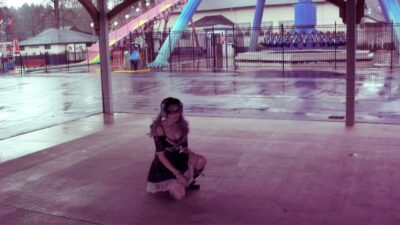
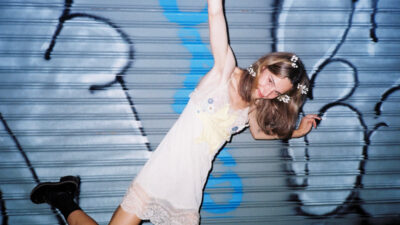
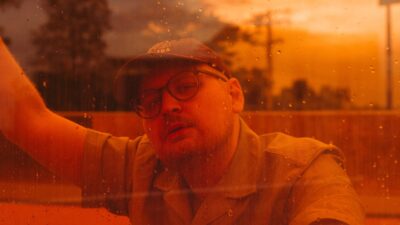
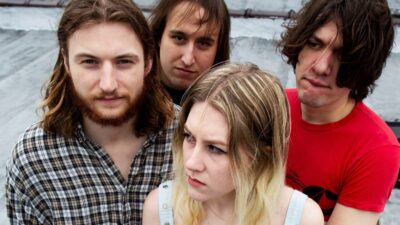
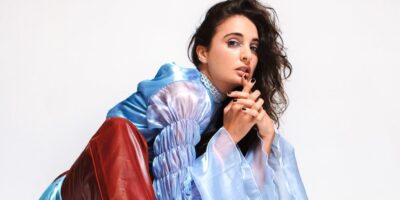
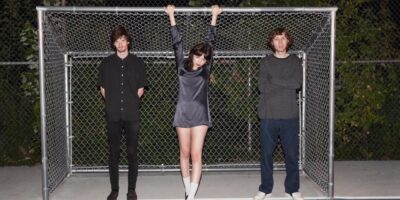
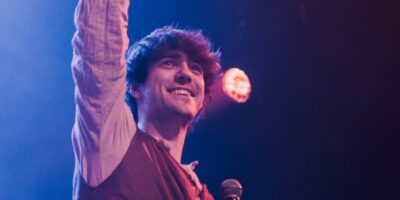
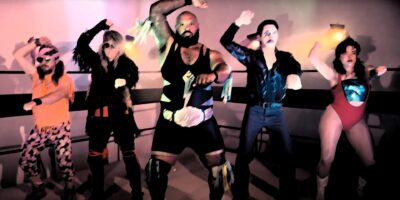
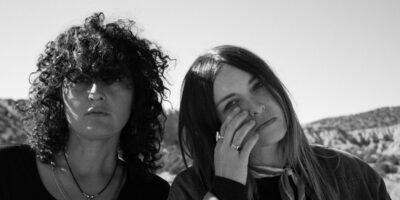
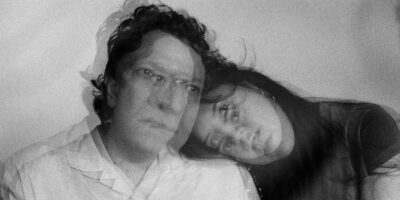




Comments